| Srl | Item |
| 1 |
ID:
036828


|
|
|
|
|
| Publication |
Princeton, Princeton University Press, 1971.
|
| Description |
xvii, 229p.
|
| Standard Number |
0691056439
|
|
|
|
|
|
|
|
|
|
|
|
Copies: C:1/I:0,R:0,Q:0
Circulation
| Accession# | Call# | Current Location | Status | Policy | Location |
| 007089 | 341/BOZ 007089 | Main | On Shelf | General | |
|
|
|
|
| 2 |
ID:
115861


|
|
|
| 3 |
ID:
087270
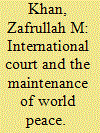

|
|
|
|
|
| Publication |
2009.
|
| Summary/Abstract |
During some periods of history, the normal rule of conduct was 'if you have strength and if the exercise of that strength can bring any benefit or credit to your country, you will be to blame if you do not have recourse to force. But with the turn of the century, people began to reflect on the fact that very seldom did the common people with to fight. However, when a decision to fight was taken, the common people went forward and fought.
|
|
|
|
|
|
|
|
|
|
|
|
|
|
|
|
| 4 |
ID:
068249


|
|
|
| 5 |
ID:
098977


|
|
|
| 6 |
ID:
134386


|
|
|
|
|
| Summary/Abstract |
The emergence of a global structure of judicialized international law in closely linked to more general effort throughout the 20th and early 21st centuries to establish an international community by law. While the proliferation of international courts (ICs) and its consequence has been described elsewhere (Romano 1999; Koskennienmi and Leino 2002; alter 2014), we know surprisingly little about the judges sitting at the helm of contemporary judicialized international law and quite literally ruling (on) the world.
|
|
|
|
|
|
|
|
|
|
|
|
|
|
|
|
| 7 |
ID:
179320
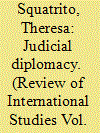

|
|
|
|
|
| Summary/Abstract |
Observers of international courts (ICs) note that several ICs carry out a broad range of non-judicial activities, ranging from legal training workshops and public seminars to visits with public officials. Despite the growing prominence of these activities, they have received little attention from scholars. Seeking to fill this gap, this article examines these activities as a form of ‘judicial diplomacy’, asking how and why ICs employ judicial diplomacy. The article argues that ICs use judicial diplomacy as a means of legitimation. They seek to boost institutional legitimacy through their judicial diplomacy by targeting the public and communicating norm-referential narratives about their processes and outcomes. This argument bears out in case studies on the judicial diplomacy of the African Court of Human and Peoples’ Rights and the Caribbean Court of Justice. Both courts are shown to have judicial diplomacy that is public-oriented and people-centred. This argument has important implications for literature on international courts and the legitimacy of international institutions.
|
|
|
|
|
|
|
|
|
|
|
|
|
|
|
|
| 8 |
ID:
101599
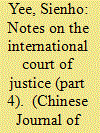

|
|
|
|
|
| Publication |
2010.
|
| Summary/Abstract |
This note first summarizes the Kosovo Advisory Opinion of the International Court of Justice of 22 July 2010 and then makes observations regarding several issues involved in the proceedings: the reformulation of the question presented by the United Nations General Assembly, the interpretation of Security Council resolution 1244 and the Constitutional Framework, self-determination and remedial secession and the unlawful use of force by the NATO in 1999.
|
|
|
|
|
|
|
|
|
|
|
|
|
|
|
|
| 9 |
ID:
158324
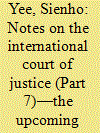

|
|
|
|
|
| Summary/Abstract |
The request for advisory opinion on the separation of the Chagos Archipelago puts in play (1) the cause of decolonization and the Court’s participation in the UN’s work in this regard and (2) the consent principle in international dispute settlement. Part II reviews in broad outline the law on this matter, which requires that the giving of an advisory opinion by the Court can only be done in a way compatible with its judicial character and with full respect for the consent principle. Part III argues that the giving of an opinion that would concern the main issues in a bilateral dispute without the requisite consent of the parties or that would have the effect of circumventing the consent principle would be incompatible with the Court’s judicial character and would constitute a compelling reason calling for the Court’s refusal to give the requested advisory opinion on such issues. Part IV elaborates that the fact that fully answering the questions put to the Court would necessitate addressing the main or essential issues, including the lawfulness of the detachment of the Chagos Archipelago from Mauritius and ultimately the validity of the detachment agreement, in the bilateral dispute between the Mauritius and the United Kingdom without the latter’s consent, and would be incompatible with the Court’s judicial character, is a compelling reason calling for the Court’s refusal to give the requested opinion on such issues. Part V maintains that in the light of decolonization being a Charter-mandated, important and traditional aspect of the UN’s work, if the Court feels compelled to give an advisory opinion, it may do so on what law may be applicable to, but not on how that law applies to, the main or essential issues involved in the bilateral dispute between the two States, especially the lawfulness of the detachment of the Chagos Archipelago from Mauritius and ultimately the validity of the detachment agreement. This approach may afford the best benefits to both sides. Part VI briefly concludes the paper.
|
|
|
|
|
|
|
|
|
|
|
|
|
|
|
|
| 10 |
ID:
024950
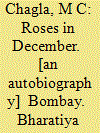

|
|
|
|
|
| Publication |
Bombay, Bharatiya Vidya Bhavan, 1973.
|
| Description |
xiv, 532p.: ill.Hbk
|
|
|
|
|
|
|
|
|
|
|
|
Copies: C:1/I:0,R:0,Q:0
Circulation
| Accession# | Call# | Current Location | Status | Policy | Location |
| 012169 | 923.254/CHA 012169 | Main | On Shelf | General | |
|
|
|
|
| 11 |
ID:
093681
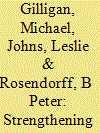

|
|
|
|
|
| Publication |
2010.
|
| Summary/Abstract |
How does variation in the strength of a court's jurisdiction and enforcement affect strategic behavior by states involved in international disputes? The authors construct a formal model and identify three important ways that legal institutions can have a deleterious effect on international cooperation by magnifying the bargaining problems arising from incomplete information about the quality of the legal claims. First, strong courts create less information revelation in pretrial bargaining. Second, strong courts reduce the likelihood of pretrial settlements between states. Third, strong courts lead to more brinksmanship over high-value assets, which leads to conflict if the court refuses to intervene. The authors argue that a key policy implication of their model is that attempts to strengthen international courts must be accompanied by increased precision of international law to ameliorate the deleterious effects of strong courts.
|
|
|
|
|
|
|
|
|
|
|
|
|
|
|
|
| 12 |
ID:
129582
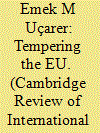

|
|
|
|
|
| Publication |
2014.
|
| Summary/Abstract |
The European Union's (EU) area of Freedom, Security and Justice (AFSJ) portfolio comprises policy areas such as immigration and asylum, and police and judicial cooperation. Steps were taken to bring this field into the mandate of the EU first by the Maastricht Treaty, followed by changes implemented by the Amsterdam and Lisbon Treaties, the last one 'normalizing' the EU's erstwhile Third Pillar. As the emergent EU regime continues to consolidate in this field, NGOs of various kinds continue to seek to influence policy-making and implementation, with varying success. This article seeks to establish the context in which NGOs carry out their work and argues that the EU-NGO interface is impacted both by the institutional realities of the European Union and the capacities of EU-oriented NGOs to seize and expand opportunities for access and input into the policy cycle. Using EU instruments representing three different policy bundles in AFSJ (immigration, asylum and judicial cooperation in criminal matters), the article seeks to map out NGO strategies in engaging and oftentimes resisting European Union policy instruments.
|
|
|
|
|
|
|
|
|
|
|
|
|
|
|
|
| 13 |
ID:
133952
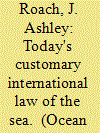

|
|
|
|
|
| Publication |
2014.
|
| Summary/Abstract |
International courts and tribunals, governments, and scholars over the past half-century (many in the past two decades) have identified various provisions of the 1958 and 1982 treaties on the law of the sea that are customary international law and thus binding on all states, including those not party to these treaties. This article systematically collects these opinions and identifies provisions that have not yet attracted their attention
|
|
|
|
|
|
|
|
|
|
|
|
|
|
|
|
| 14 |
ID:
111935
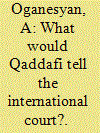

|
|
|
|
|
| Publication |
2012.
|
| Summary/Abstract |
"MUAMMAR QADDAFI'S GRUESOME DEATH sent a message to dictators around the world." These words by U.S. President Obama sent waves of enthusiasm in the West European media (the German media, however, remained immune). The question is: What sort of a message? What produced a greater impression: the bodies of lynched Mussolini and his mistress hung upside down on meat hooks from the roof of an Esso gas station or the Nuremberg trial which revealed the man-hating nature of Nazism? The answer is obvious even though the scopes of historical contexts and personalities are widely different.
|
|
|
|
|
|
|
|
|
|
|
|
|
|
|
|